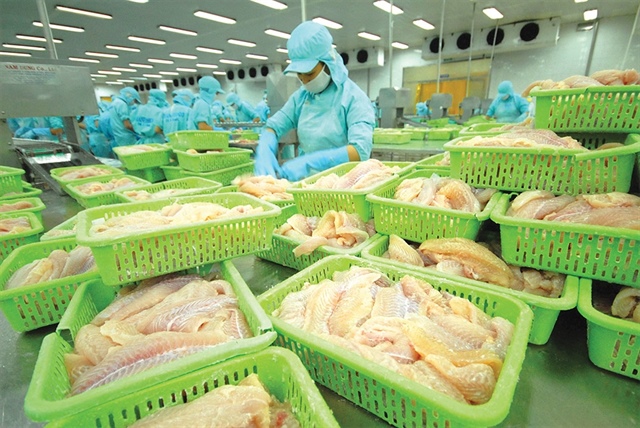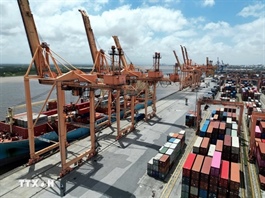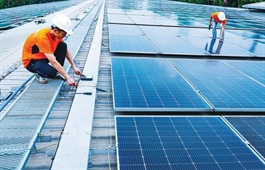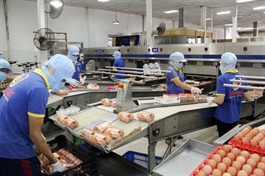Vietnam, US to smooth trade
Vietnam, US to smooth trade
Fuelled by a bilateral comprehensive strategic partnership, Vietnam is actively working with the United States on the early recognition of its market economy status in a bid to help Vietnamese goods shun market risks.
On July 21 in Hanoi, Vietnamese National Assembly (NA) Vice Chairman Tran Quang Phuong met with US Ambassador to Vietnam Marc E. Knapper, following the two countries recently reaching a preliminary trade deal in which the US would significantly reduce reciprocal taxes on many Vietnamese exports and continue to cooperate with Vietnam in resolving challenges affecting bilateral trade, particularly in areas prioritised by the two sides.
Ambassador Knapper said the US wants to closely combine with Vietnam to effectively carry out all contents of the two countries’ comprehensive strategic partnership forged two years back in all pillars carved in the partnership, especially “to promote high-level contacts, and expand bilateral substantial cooperation in the sectors of economy-trade-investment, education-training, defence-security, and overcoming war consequences”.
He also said the American business community has been particularly encouraged by the outcomes of the recent National Assembly’s (NA) ninth session, especially those related to the digital economy and the development of high-tech infrastructure.
Vice Chairman Phuong said that Vietnam is boosting law reform in favour of individuals and enterprises, in which the country especially underlines the application of science and technology and innovation, as well as national digital transformation as one of the prime tasks and targets, which will help facilitate businesses and individuals, and boost transparency in lawmaking.
“Accordingly, the NA vice chairman proposed that the ambassador and the embassy continue to strengthen activities to foster connections, promote cooperation, facilitate technology transfer, and support Vietnam in becoming a regional hub for high technology and a key link in the global semiconductor supply chain,” stated the Vietnamese Ministry of Foreign Affairs (MoFA).
Especially, “the vice chairman asked the ambassador and the embassy to help push the US to soon recognise Vietnam’s market economy status and to remove Vietnam from the D1 and D3 strategic export control lists,” the MoFA stated. The D1 list concerns national security, while the D3 list involves chemical and biological controls.
During a phone call with US President Donald Trump on July 2, Party General Secretary To Lam also proposed that the US soon recognise Vietnam as a market economy and remove export restrictions on certain high-tech products, the MoFA stated.
Earlier in May, Vietnamese Prime Minister Pham Minh Chinh met in Hanoi with Reva Price, chair of the US Congress’ US-China Economic and Security Review Commission. He called on the US to recognise Vietnam as a market economy, remove the country from D1 and D3 strategic export control lists, and increase technology transfer to deepen bilateral cooperation.
Vietnam has many a time asked the US to do so, to make its exports to the US market more favourable. In 2023, Vietnam filed an official request that the US Department of Commerce (DoC) consider it a market economy, citing the country’s economic reforms made in recent years. If the status upgrade is accepted by the DoC, it will mean an end to high tax (anti-dumping and countervailing duty) on Vietnamese imports in the US.
Recognising Vietnam’s market-oriented reforms will ultimately benefit the US economy by diversifying supply chains.
“In any case, if Washington DC decides to change Vietnam’s non-market economy (NME) status to a market economy label, there will be significant implications for trade relations and broader geopolitical dynamics in the Asia-Pacific region,” said Asia Briefing, a subsidiary of consultancy firm Dezan Shira & Associates.
The US has considered Vietnam an NME since 2002. Per US law, an NME is defined as any foreign country that the DoC determines does not adhere to market principles regarding cost or prices, leading to the sale of goods within that country failing to reflect their fair value. Currently, according to Asia Briefing, the US assesses the value of a product intended for import from an NME like Vietnam by referencing a third country – a market economy such as Bangladesh. It uses the perceived product value in Bangladesh as a benchmark.
Consequently, this benchmark is presumed to represent the production cost for a Vietnamese company, without consideration for the company’s actual cost data. This calculation causes the dumping margin to be pushed up high and does not actually reflect the situation of Vietnamese companies.
Also on July 2, General Secretary Lam and President Trump also discussed several key directions and measures to promote the US-Vietnam comprehensive strategic partnership in the coming years. “They agreed to increase exchanges of delegations, high-level contacts, and all-level interactions, and to promote bilateral cooperation in economics, trade, and investment, particularly in key sectors such as science and high technology,” the MoFA stated.
Vietnam’s exports to the US reached $119.6 billion last year and $70.9 billion in the first half of 2025, stated the Vietnamese Ministry of Industry and Trade (MoIT).
Vietnam is to work with the US on ways to reach a trade balance. The MoIT said that the main reason for the trade imbalance between the two countries comes from the complementary nature of the two economies, which is due to the export and foreign trade structure of the two countries, not due to other reasons.
“Vietnamese exports to the US compete with those from the third nations, not directly with US enterprises in the US market. Meanwhile, they even also create conditions for US consumers to use Vietnamese goods at cheap prices,” said Deputy Minister of Industry and Trade Nguyen Sinh Nhat Tan.
Additionally, at present, there has been a policy dialogue mechanism on trade and investment between the two countries under the Vietnam-US Trade and Investment Framework Agreement, founded in 2007. Therefore, existing problems in bilateral trade and economy, if any, will be proactively discussed through the US-Vietnam Council on Trade and Investment. This is a mechanism that has created a common vision, contributed to the long-term direction, and stabilised the development of bilateral economic and trade relations, the MoIT said.
According to Vietnam’s Ministry of Finance, cumulatively as of late June, the US was Vietnam’s 11th largest foreign investor with total registered capital of nearly $12 billion for nearly 1,470 valid projects.
In the first half of this year, total newly registered and newly added capital and stake acquisition and capital contributions from US investors in Vietnam stood at $250 million.
US investors are encouraged to expand investment in Vietnam industries such as science and technology, innovation, research and development, green economy, digital economy, circular economy, knowledge-based economy, chip industry, semiconductor, AI, Internet of Things, new energy, renewable energy, finance, financial centres, biotechnology, and healthcare.
Meanwhile, currently Vietnam has about 230 valid projects in the US, with total registered capital of $1.26 billion.
|
Nguyen Lan Phuong, partner, Baker McKenzie
A US designation of Vietnam as a market economy will have important implications for Vietnamese goods exported to the US. Under the current standard, wherein Vietnam is designated a non-market economy by the US, there is a risk that Vietnamese goods may be subject to inflated import duties imposed via trade remedies provided for in the World Trade Organization (WTO) agreements.
This is because when imposing WTO trade remedies, the US can disregard domestic prices in non-market economies. This is disadvantageous for exporters of Vietnamese goods, since it means that actual economic realities in Vietnam will not factor into the trade remedy price assessment.
While all international trade comes with a risk of increased costs due to the imposition of trade remedies, after a market economy designation the magnitude of the risk will be reduced for Vietnamese goods exported to the US.
When it comes to impacts on the two nations’ trade relations, designation of Vietnam as a market economy will improve predictability for exporters in Vietnam, since the imposition of WTO trade remedies in the US will take actual economic realities of producers and exporters in Vietnam into account.
There are important political implications as well, since the market economy designation will be a significant acknowledgement that Vietnam’s economy functions according to certain free market principles.
This discussion should be reviewed in conjunction with the changing policy on foreign trade of the US government, but over the long run a market economy designation is still an especially encouraging development in trade relations.
- 10:53 30/07/2025




























